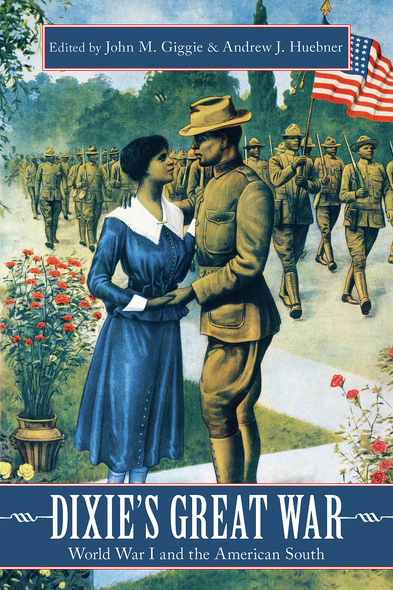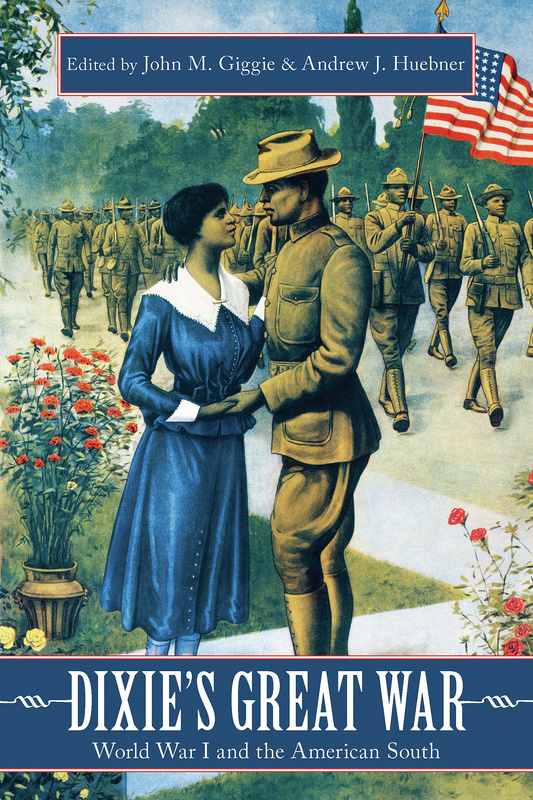Our shopping cart is currently down. To place an order, please contact our distributor, UTP Distribution, directly at utpbooks@utpress.utoronto.ca.
Dixie's Great War
World War I and the American South
SERIES:
War, Memory, and Culture
University of Alabama Press
Examining the First World War through the lens of the American South
How did World War I affect the American South? Did southerners experience the war in a particular way? How did regional considerations and, more generally, southern values and culture impact the wider war effort? Was there a distinctive southern experience of WWI?
Scholars considered these questions during “Dixie’s Great War,” a symposium held at the University of Alabama in October 2017 to commemorate the centenary of the American intervention in the war. With the explicit intent of exploring iterations of the Great War as experienced in the American South and by its people, organizers John M. Giggie and Andrew J. Huebner also sought to use historical discourse as a form of civic engagement designed to facilitate a community conversation about the meanings of the war.
Giggie and Huebner structured the panels thematically around military, social, and political approaches to the war to encourage discussion and exchanges between panelists and the public alike. Drawn from transcriptions of the day’s discussions and lightly edited to preserve the conversational tone and mix of professional and public voices, Dixie’s Great War: World War I and the American South captures the process of historians at work with the public, pushing and probing general understandings of the past, uncovering and reflecting on the deeper truths and lessons of the Great War—this time, through the lens of the South.
This volume also includes an introduction featuring a survey of recent literature dealing with regional aspects of WWI and a discussion of the centenary commemorations of the war. An afterword by noted historian Jay Winter places “Dixie’s Great War”—the symposium and this book—within the larger framework of commemoration, emphasizing the vital role such forums perform in creating space and opportunity for scholars and the public alike to assess and understand the shifting ground between cultural memory and the historical record.
How did World War I affect the American South? Did southerners experience the war in a particular way? How did regional considerations and, more generally, southern values and culture impact the wider war effort? Was there a distinctive southern experience of WWI?
Scholars considered these questions during “Dixie’s Great War,” a symposium held at the University of Alabama in October 2017 to commemorate the centenary of the American intervention in the war. With the explicit intent of exploring iterations of the Great War as experienced in the American South and by its people, organizers John M. Giggie and Andrew J. Huebner also sought to use historical discourse as a form of civic engagement designed to facilitate a community conversation about the meanings of the war.
Giggie and Huebner structured the panels thematically around military, social, and political approaches to the war to encourage discussion and exchanges between panelists and the public alike. Drawn from transcriptions of the day’s discussions and lightly edited to preserve the conversational tone and mix of professional and public voices, Dixie’s Great War: World War I and the American South captures the process of historians at work with the public, pushing and probing general understandings of the past, uncovering and reflecting on the deeper truths and lessons of the Great War—this time, through the lens of the South.
This volume also includes an introduction featuring a survey of recent literature dealing with regional aspects of WWI and a discussion of the centenary commemorations of the war. An afterword by noted historian Jay Winter places “Dixie’s Great War”—the symposium and this book—within the larger framework of commemoration, emphasizing the vital role such forums perform in creating space and opportunity for scholars and the public alike to assess and understand the shifting ground between cultural memory and the historical record.
‘By bringing together leading scholars of the period to share their insights, this fascinating collection develops a nuanced range of information about the war and its effects on the South and southerners. The war’s immediate and long-term consequences for the United States were profound, but relatively few works have explored the war’s consequences on the home front. This collection makes an important contribution
to our understanding of the war in the South.’
—David A. Davis, author of World War I and Southern Modernism
'The volume does an excellent job highlighting the ways the war experience transpired in the South and how the South influenced the larger national whole, though the scholars emphasize that they do not find an entirely distinctive southern experience. Indeed, the contributors add to the historiography by showing how the war helped flatten regional distinctions.'
—The Journal of Southern History, Vol. LXXXVIII
'The contributions to Dixie's Great War. . . are intended to follow closely what the participants actually said, and how they responded to what audience members said. The goal was to preserve all the spontaneity of historical give-and-take, with the object of showing what Jay Winter considers 'a glimpse of how historians operate.''
—The Alabama Review
The wide-ranging conversation in Dixie's Great War touches on a number of important facets of the South's participation in World War I. From military service to civil rights, and from the home front to the legacy of the conflict, this work provides an engaging and approachable introduction to scholarly discussion of this transformative moment in the Southern history.’
—Matthew L. Downs, co-editor of The American South and the Great War, 1914-1924
'Dixie’s Great War. . .serves as a fascinating and informative overview of the southern experience of World War I. Although some may find the format unorthodox, it provides a unique study of the Great War and its effects.'
—Jessica Brabble, H-Net Reviews
In Dixie’s Great War a wide-ranging and expert group of historians demonstrate how to engage with the history of American warfare and the history of the American South that is timely and accessible. The format of a dialogue between panelists with the public participation illuminates the tension between the study of the past, lived experience, and memory. The volume embraces this tension and thereby helps to advance our understanding of changes wrought in the South by World War I as well as better position so-called ‘Southern exceptionalism’ in the history of the nation as a whole at a critical juncture.’
— Taylor Jaworski, University of Colorado, Boulder
John M. Giggie is associate professor of history and African American studies at the University of Alabama, where he serves as director of the Summersell Center for the Study of the South and as a Distinguished Teaching Fellow. He is author of After Redemption: Jim Crow and the Transformation of African American Religion in the Delta, 1875–1917, coauthor of The Unfinished Nation: A Concise History of the American People with Alan Brinkley and Andrew J. Huebner, and editor of Faith in the Market: Religion and the Rise of Commercial Culture.
Andrew J. Huebner is professor of history at the University of Alabama. He is author of Love and Death in the Great War and The Warrior Image: Soldiers in American Culture from the Second World War to the Vietnam Era,and coauthor of The Unfinished Nation: A Concise History of the American People with Alan Brinkley and John M. Giggie.
Andrew J. Huebner is professor of history at the University of Alabama. He is author of Love and Death in the Great War and The Warrior Image: Soldiers in American Culture from the Second World War to the Vietnam Era,and coauthor of The Unfinished Nation: A Concise History of the American People with Alan Brinkley and John M. Giggie.





